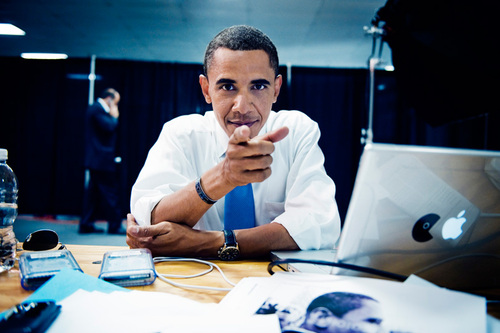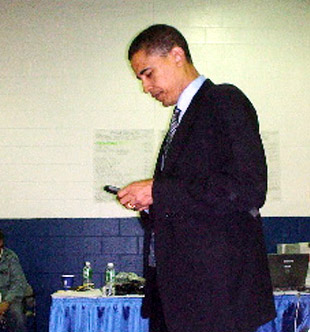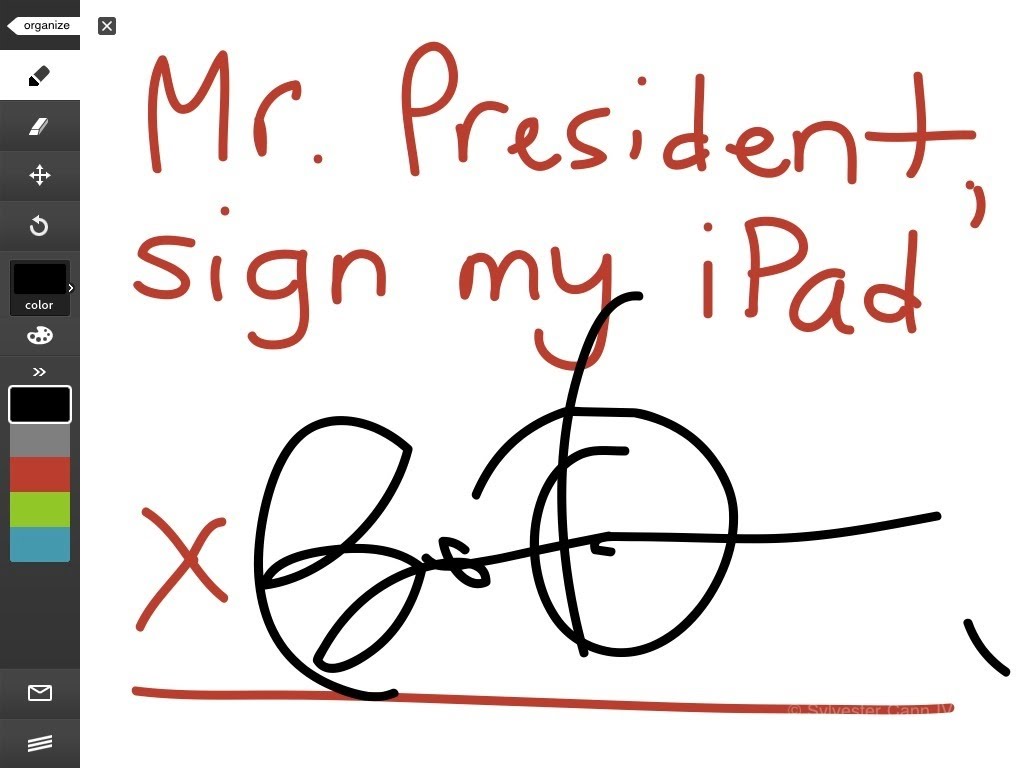What Obama's Re-election Means for the Technology World
The old and new president of the U.S. has taught us over the past four years how he believes technology issues should be integrated into the government's policy.
His re-election suggests a continuation of that plan that has revealed itself via green tech investments, education and additional funding to the National Institutes of Health (NIH) as well as the National Science Foundation (NSF), which is subject to sequestration. But what about topics that are increasingly important and will be new on the president's desk, such as cybersecurity, net neutrality and online piracy?
Cybersecurity
We have grown used to hacking attacks, whether they are on a private level threatening companies, or on government level, where we are still learning about sophisticated malware attacks. Such attack almost seem to be taking the place of cold-war era spying missions that operate under the cover of the interests of national security. Whether that can be justified or not, the U.S. has no clear legal foundation for implementing attack or defense. Congress was supposed to pass legislation that was supposed to protect critical computer networks from cyberattacks, but failed to do so. Obama's administration drafted an executive order to bypass Congress and it is reasonable to expect the president to proceed with this order. There is also recent indication that the private industry will participate in this imitative as AMD, Intel, Honeywell, Lockheed Martin and RSA formed the Cyber Security Research Alliance to improve the communication with the government on this topic.
In an interview with the Wall Street Journal on July 19 of this year, Obama was quoted saying:
"[M]y administration has made cybersecurity a priority, including proposing legislation to strengthen our nation's digital defenses… We need to make it easier for the government to share threat information so critical-infrastructure companies are better prepared. We need to make it easier for these companies—with reasonable liability protection—to share data and information with government when they're attacked. And we need to make it easier for government, if asked, to help these companies prevent and recover from attacks [...] Cybersecurity standards would be developed in partnership between government and industry."
Net Neutrality
Net neutrality is one of those topics that will not go away until it is not fully addressed. In his State of the Union Q&A in February of 2010, Obama said: "I'm a big believer in net neutrality [...] We don't want to create a bunch of gateways that prevent somebody who doesn't have a lot of money but has a good idea from being able to start their next YouTube or their next Google on the Internet."
Get Tom's Hardware's best news and in-depth reviews, straight to your inbox.
He followed through with this statement with Julius Genachowski, a strong supporter of net neutrality and the chairman of the FCC. Furthermore, he threatened to veto a Republican plan to revert the FCC rules on net neutrality in December 2010. There is no reason to believe a change in Obama's direction in favor of government regulation, even if it does not take much to foresee more challenges in this area and he will have to address this topic more aggressively.
Online Piracy
Obama's administration has sown that it takes a much more careful approach to approach piracy threats than what we have seen, for example, with SOPA recently. The White House response to SOPA reads as follows:
"While we believe that online piracy by foreign websites is a serious problem that requires a serious legislative response, we will not support legislation that reduces freedom of expression, increases cybersecurity risk, or undermines the dynamic, innovative global Internet. Any effort to combat online piracy must guard against the risk of online censorship of lawful activity and must not inhibit innovation by our dynamic businesses large and small. […] We must avoid creating new cybersecurity risks or disrupting the underlying architecture of the Internet."
Notes of an open Internet are just as frequent in Obama's speeches as the need to address cybersecurity and piracy. In a note published by Scientific American on September 4 of this year, the president addressed cyberthreats to the United States in general, but made this comment as well: "A free and open Internet is an essential component of American society and of the modern economy. […] It is essential that we take steps to strengthen our cybersecurity and ensure that we are guarding against threats to our vital information systems and critical infrastructure, all while preserving Americans' privacy, data confidentiality, and civil liberties and recognizing the civilian nature of cyberspace."
Internet Advertising
You may not view the Do-Not-Track (DNT) feature in web browsers as that important as the W3C even suggests that DNT should be turned off by default. However, Obama has taken sides and recently said that it wants a DNT option on websites to allow consumers to better control their personal information. As data grows much more important on one side, but consumer interests are threatened on the other, the administration has indicated that it will intervene to solve the conflict via congressional legislation.
Broadband
The administration has a history of making broadband a more important topicBack in 2010, Obama announced a plan to make $795 million available for broadband expansion. In June of this year, the president initiated "US Ignite", which had a tough time to get off the ground, but is designed to create a national network of communities and campuses with programmable broadband services running at speeds of up to 1 gigabit per second. Especially over the past two years, the discussion about the availability of wireless broadband intensified, especially with a proposal to bring wireless Internet service to 98 percent of the U.S. population. The original plans appear to focused on technologies such as WiMax, and there is no doubt that these approaches need tweaking, including the ways how they will be financed.
Patents
It does not take much more than an occasional look through IT headlines to figure out that patent law is not just a chronic headache of the nation's technology industry anymore, but a virus that is slowing and stalling innovation. Obama says that he favors a "modernized patent system". He refers to the America Invents Act, which was signed into law in September 2011. His updated statement reads:
"The patent reform law helps companies and inventors avoid costly delays and unnecessary litigation—letting them focus instead on innovation and job creation. Many key industries in which the United States leads, such as biotechnology, medical devices, telecommunications, the Internet, and advanced manufacturing, depend on a strong and healthy intellectual property system. […] The America Invents Act offers entrepreneurs new ways to avoid litigation regarding patent validity, without the expense of going to U.S. District Court, and will also give the USPTO new tools and resources to improve patent quality. In addition to these new tools, the USPTO is also hiring 100 new judges to adjudicate cases in front of the Board of Patent Appeals and Interferences, helping to decrease the backlog of patent appeals cases, and reduce wait times for appellants."

Wolfgang Gruener is an experienced professional in digital strategy and content, specializing in web strategy, content architecture, user experience, and applying AI in content operations within the insurtech industry. His previous roles include Director, Digital Strategy and Content Experience at American Eagle, Managing Editor at TG Daily, and contributing to publications like Tom's Guide and Tom's Hardware.
-
axiler ReplyThe patent reform law helps companies and inventors avoid costly delays and unnecessary litigation—letting them focus instead on innovation and job creation
So..Apple being awarded with the patent for actual rounded rectangle allows the to focus on innovation how?...
Source - http://arstechnica.com/apple/2012/11/apple-awarded-design-patent-for-actual-rounded-rectangle/ -
classzero axilerSo..Apple being awarded with the patent for actual rounded rectangle allows the to focus on innovation how?...Source - http://arstechnica.com/apple/2012/ rectangle/here at the bottom of your linkReply
I think most people don't understand what it means that this is a design patent - it's not the same thing as a "regular" patent (a utility patent). Design patents allow a company to get an exclusive right to the form of a functional object so that a 3rd party can't make a different device with identical appearance (well, not legally at least). Almost every company that puts the time into making a distinctive shape for their devices gets one: Microsoft has one for the Xbox, George Lucas got one for Yoda etc.
Design patents are extremely narrow - you have to do your level best to copy them exactly in order to be found in infringement. Plus, they specifically cannot cover functionality - that has to be covered by a utility patent, if it's going to be protected. This design patent only protects a "portable display device" (that's the wording in the Patent itself), and only one with those specific design elements that are shown in the Patent Figures. -
djscribbles axilerSo..Apple being awarded with the patent for actual rounded rectangle allows the to focus on innovation how?...Source - http://arstechnica.com/apple/2012/ rectangle/Reply
Nevermind that the quote is most likely regarding the reform to the patent system (such as first-to-file) rather than praise for the way the system is working. -
deadlockedworld ReplyObama's administration has sown
Like wheat? What will grow from this planting? -
I like it when the government is computer illiterate. I'd rather have a senile old dude who wants to put a wiretap on my landline than a slick, savvy NSA that can use supercomputers to track and log every interaction I make with every facet of the digital world.Reply
-
Marco925 Except Obama bends over for Hu Jintao. Keep bending over obama! when our good friends in democratic Taiwan, where our IT comes from, ends up going into the hands of selfish dictators who would not hesitate to grab hold of us in the nads by imposing an embargo on IT Equipment if we don't follow their interests, you can say bye bye to your precious blackberry! Keep denying billions of dollars in economic growth for F16 Fighter jets to taiwan because China kicked and screamed No! Not only is the IT industry at stake, but the 23 million who depend on you for protection of their democratic rights as an ally are also at stake!Reply
/endrant -
esrever I wish there was a way for someone else thats not rich and supported by one the 2 main parties to even have a chance of winning.Reply -
I may have too young to vote, but i wish Ross Perot was president back in 92'. Anyway, after congress passed a broadband bill for everyone in the US, i have to yet receive any in my place. Instead, my telephone bill doubled because of this compromise. #&!* you ATT!Reply


